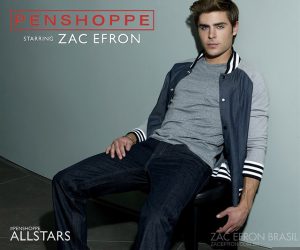
The Advertisement
As a Filipino-born Canadian student who often returns to The Philippines, one of the social issues that I notice with every visit is the internalization of whiteness within Filipino media. The advertisement above depicts Zac Efron—a white, non-Filipino, Hollywood celebrity—modelling for a Filipino brand whose main consumers are Southeast Asians. Among Penshoppe’s other models are Kendall Jenner, Ed Westwick, and Cara Delevigne.
Although a seemingly harmless advertisement, this poster is merely one of the numerous examples of the permanent skin hierarchy colonialism has left in the country. This hierarchy placed people with Caucasian aesthetics (Spanish settlers at the time)—such as having light skin tones—at the top, holding statuses of nobility. Meanwhile, darker skinned, native Filipino people were deemed as poor due to the idea that extended hours of laborious work under the sun darkened one’s skin (Hunter, 2007). In addition to this colorism, “whitening” soaps, cosmetics, and lotions are readily available in grocery stores and drugstores with the purpose of lightening one’s skin to the point of achieving a Caucasian complexion.
Why does this pose a potential problem? As a nation comprised of a combination of lighter-skinned mestizos and darker-skinned moreno people, classism according to skin tone has become a normal aspect of the culture. In television shows and movies, lighter-skinned Filipino actors/actresses (often of mixed parentage) portray main characters, while darker skinned actors/actresses are given comedic relief and maid roles. Portrayals such as this continue to uphold Caucasian aesthetics as a superiority factor which, for many full-Filipinos, is an unattainable standard. Of course, Penshoppe can argue that featuring non-Filipino models is a progression towards diversity as the brand’s defense. However, for a culture that—during centuries of Spanish colonization—been classing its people based on how “white” one person looks over someone who looks more ethnic, representations like this advertisement continue to perpetuate this outdated colonialist prejudice.

My “Jammed” Version
I made two corrections to the original advertisement. In my version, I removed Zac Efron and replaced him with a tan-skinned, full-Filipino celebrity. Although a minor change, this jammed version promotes authentic Filipino cultural identity that reflects the natural appearance of Filipino people. I hope that by displaying an actual Filipino model, Penshoppe’s target audience subverts their gaze from Caucasian perfection to appreciate their own natural appearances.
The second correction I made is replacing Efron’s name to, “a person of colour who matches the brand’s target customers.” I purposely excluded the celebrity’s name in favour of this caption with the intention of provoking the thoughts of Penshoppe’s Southeast Asian consumers. Additionally, with only a third of the population completing post-secondary education (Philippines, 2019), the majority of the country’s people are not informed about the social injustices that this advertisement promotes. My new caption hopes to bring salience to this issue to people who may not realize its negative impact. Penshoppe, unfortunately, seems to have exploited this condition, by upholding white superiority to maximize the company’s profits.
In the original, using a foreign white celebrity may have been motivated by current standards of “beauty” to attract people into buying the brand. Underneath this innocent marketing ploy, however, lies the erasure of natural Filipino beauty that existed before colonization. As a large Filipino-established brand, Penshoppe can and should be using their popularity to glorify the natural beauty of Filipino phenotypes rather than suppress it. Hopefully, provocative advertisements like this become more popular, triggering consumers to think twice about a company’s secondary messages before making a purchase.
References:
Hunter, M. (2007). The Persistent Problem of Colorism: Skin Tone, Status, and Inequality. Sociology Compass, 1(1), pp.237-254.
Philippines. (2019). Retrieved February 14, 2019, from http://uis.unesco.org/country/PH
Recent Comments